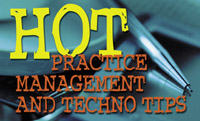
To whom can attorneys turn for
real, practical office management and computer tips geared especially
for them?
For starters, turn to your colleagues, professional staff, and
consultants.
The Law Practice Section and Solo and Small Firm Practice Committee
cosponsored "60+ Hot Practice Management and Techno Tips in 60 Minutes"
at the Bar's annual convention in June. In the interest of space, the
presenters offer their favorite tips. Nothing said in this article is to
be construed as a State Bar endorsement of any brand or product.
- Tips
from Debra Hix-Sykes, President & CEO, DHS & Associates,
Milwaukee.
- Tips
from David Grove, Owner of Grove Law Office, DeForest.
- Tips
from Ross L. Kodner, Founder of MicroLaw Inc., Milwaukee.
- Tips
from Lori Kannenberg, Law firm administrator, Lawton & Cates
S.C., Madison.
|
| David Grove |
Owner of Grove Law Office, DeForest,
a general practice firm. He primarily practices estate planning,
corporate law for closely held business owners, creditor-debtor law, and
civil litigation |
Know Your Spreadsheet
Take time to put together spreadsheets that
handle many of your day-to-day exhibits or calculations. Examples:
Divorce property division and financial disclosure worksheets; wage
calculations if still done internally without an accounting program.
Simplify Routine Correspondence
Set up "check-the-box" type of forms for routine communication. These
can be broken down by legal practice areas and even made with carbonless
copies for file receipts. None of these sheets needs to be over a
half-page wide, which saves paper and mailing expense.
Think Up Creative Customized Ink-stampS
I found it useful to have a stamp that allows me to "check the box"
as to whether I filed a particular document to the court, to opposing
counsel, and to the client, along with the date that I did it.
There are Headsets ... and Then There are
Headsets
The number one productivity-enhancing tool that I found is to have a
wireless 900 mhz headset. This not only allows hand free operation, but
I am desk-free as well.
Clean Up Your Tools
The toolbar - the row of icons at the top - in all Microsoft
applications can be customized to fit the actions that you do the most.
To replace icons you do not use, click View, choose Toolbars, then
choose Customize from the next menu. From the Command tab, simply drag
and drop any icon you want, and/or drag any command you do not want off
the tool bar. You can even arrange the order this way.
Customize Your Menu
Drop-down menus also can be customized the same way. In addition, in
Office 2000, menus will only show your most frequently used commands. To
see all menu choices, click the Tools menu, and choose Customize; under
Options, uncheck "Menus show recently used commands first."
Eliminate Your "Office Assistant"
Office has an annoying "assistant" that is always in the way. To get
rid of it, select Hide the Office Assistant from the Help menu. If you
do it three times, it will ask if you want this to be permanent. Office
97 users will need to right-click on Clippit, choose Options, and then
clear all selected options to eliminate your assistant.
Learn to Use the Middle Scroll Wheel on Your
Mouse
It can help you adjust the size of your View. Simply hold down the
control key and scroll the zoom in or out. It also can help you scroll
down the windowpane bars, and on some, a simple click allows you to use
the mouse to control moving the document up or down.
Wisconsin Lawyer
